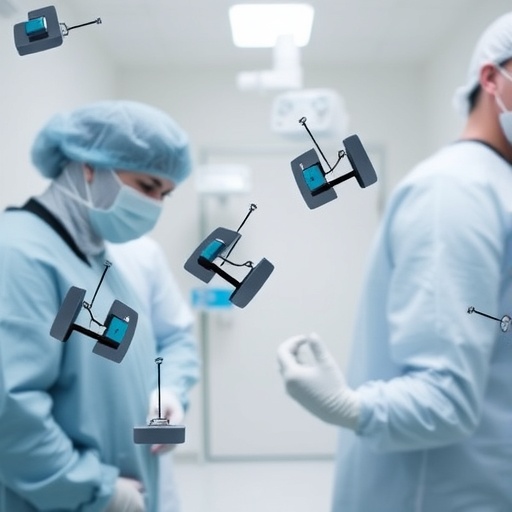In recent years, healthcare systems around the globe have faced an increasing challenge posed by multidrug-resistant organisms (MDROs). In a comprehensive study published in Scientific Reports, researchers Myrou, Savvakis, and Kiouli et al. examined the effectiveness of active surveillance strategies at a tertiary hospital in Northern Greece. As antibiotic resistance continues to surge, the insights gleaned from this investigation are both timely and critical for informing public health strategies.
The emergence of MDROs reflects a growing concern not only for healthcare professionals but for the public at large. Infections caused by these organisms lead to extended hospital stays, increased healthcare costs, and higher morbidity and mortality rates. The implications of these infections extend beyond the individual; they pose a systemic risk to healthcare institutions, necessitating the implementation of rigorous surveillance programs. The study conducted in Northern Greece sheds light on how such programs can be structured and their potential impact on patient outcomes.
The research team’s focus on active surveillance is particularly noteworthy. Unlike passive surveillance methods that rely on healthcare providers to identify and report infections, active surveillance employs a more proactive approach. This may include routine screening of patients for MDRO colonization, regardless of whether they are exhibiting symptoms. The authors argue that this strategy can significantly enhance early detection, allowing for timely interventions that could prevent the spread of these resistant pathogens within hospital settings.
One of the key findings of the study is the high prevalence of MDRO colonization among patients admitted to the hospital. The data collected during the surveillance revealed staggering rates of colonization that could easily go unnoticed without systematic screening. This underscores the importance of establishing a dedicated protocol for monitoring patients upon admission and throughout their stay, which could serve as a model for other healthcare institutions facing similar challenges.
As part of the study, the authors utilized a robust methodology that included a comprehensive review of patient records, microbiological testing, and rigorous statistical analysis. This multifaceted approach not only validated their findings but also provided a framework for understanding the dynamics of MDRO colonization within the hospital environment. The compelling data gathered serves as a call to action for healthcare administrators to prioritize such surveillance programs as essential components of infection control.
The implications of the findings are profound. Healthcare facilities must adapt their infection control measures to address the growing threat of MDROs. Active surveillance could lead to immediate benefits, such as reduced transmission rates within the hospital and improved patient safety outcomes. The research suggests that implementing these strategies may also foster a culture of accountability among healthcare workers, as they are made more aware of the risks associated with MDROs through ongoing education and proactive monitoring.
Beyond inpatient care, the findings of this study carry significant ramifications for outpatient settings and community health. As patients move between hospital and community environments, the risk of MDRO transmission increases. Therefore, active surveillance should not be confined to hospital walls but must be extended into community healthcare settings to ensure comprehensive management of these resistant organisms.
Moreover, the role of education and training in combating MDRO colonization is emphasized throughout the study. Healthcare professionals must be well-informed about the nature of antibiotic resistance and the importance of adhering to infection control protocols. Continuous education initiatives should be developed to keep staff updated on best practices for screening and managing MDROs effectively.
Furthermore, collaborative efforts among healthcare institutions, public health agencies, and community organizations are critical for creating a unified front against MDROs. By sharing data and resources, these partnerships can enhance the effectiveness of surveillance programs and streamline the implementation of best practices across different healthcare settings. The study illustrates that a coordinated approach is not merely beneficial but essential in the fight against antibiotic resistance.
Another noteworthy aspect of the research is its consideration of the psychosocial factors associated with MDRO colonization and infection. While the biological and clinical aspects of these organisms are of paramount importance, understanding patient perspectives is equally crucial. Patients often face stigmatization due to their colonization status, which can affect their mental well-being and willingness to seek care. Integrating patient education about MDROs within active surveillance programs may alleviate some of these concerns and foster a more supportive healthcare environment.
In conclusion, the study by Myrou and colleagues provides vital insights into the active surveillance of MDRO colonization in a tertiary hospital setting. The alarming prevalence of these organisms highlights the urgent need for rigorous monitoring protocols that encompass both inpatient and outpatient care. By embracing active surveillance and fostering collaboration and education, healthcare systems can better respond to the pressing issue of antibiotic resistance, ultimately safeguarding public health.
In light of these findings, it is clear that the battle against MDROs is far from over. However, with increased awareness, robust surveillance strategies, and a commitment to education, the medical community can begin to turn the tide against these formidable foes. As this research demonstrates, the future of patient safety and infection control depends on proactive measures that leave no stone unturned in the fight against multidrug-resistant organisms.
Subject of Research: Active surveillance of multidrug-resistant organism colonization in a tertiary hospital in Northern Greece.
Article Title: Active surveillance of multidrug-resistant organism colonization in a tertiary hospital in Northern Greece.
Article References:
Myrou, A., Savvakis, S., Kiouli, C. et al. Active surveillance of multidrug-resistant organism colonization in a tertiary hospital in Northern Greece. Sci Rep 15, 40280 (2025). https://doi.org/10.1038/s41598-025-24140-2
Image Credits: AI Generated
DOI: https://doi.org/10.1038/s41598-025-24140-2
Keywords: multidrug-resistant organisms, active surveillance, infection control, patient safety, antibiotic resistance, healthcare systems, hospital infection, prevention strategies.




